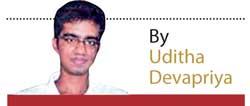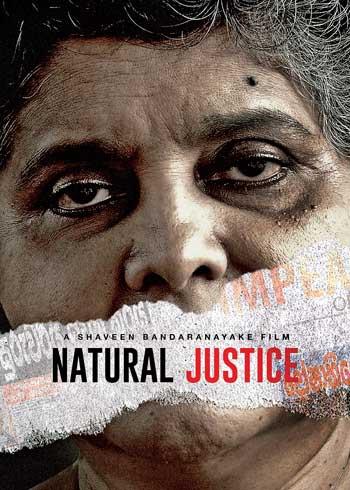26 Feb 2019 - {{hitsCtrl.values.hits}}
Shaveen Bandaranayake’s Natural Justice is a textbook summary of some of the darkest days this country’s judiciary encountered
 On October 30, 1996, Shirani Bandaranayake was appointed as a Judge of the Supreme Court of Sri Lanka. The Government had proposed a power-sharing package and was attempting to reach a settlement with the Tigers. It was at the height of the devolution debate, and Bandaranayake, who was supportive of decentralisation (Her Fulbright Research area was “Regional Devolution/Distribution of Power”), was selected in the light of these developments on a recommendation by G. L. Peiris.
On October 30, 1996, Shirani Bandaranayake was appointed as a Judge of the Supreme Court of Sri Lanka. The Government had proposed a power-sharing package and was attempting to reach a settlement with the Tigers. It was at the height of the devolution debate, and Bandaranayake, who was supportive of decentralisation (Her Fulbright Research area was “Regional Devolution/Distribution of Power”), was selected in the light of these developments on a recommendation by G. L. Peiris.
Needless to say, the appointment generated controversy. Her critics argued, and not without reason, that her ascent to the Supreme Court was politically motivated.
A group of lawyers took their grievances to Courts and contended that the President had overstepped her powers in selecting Ms Bandaranayake. The Courts dismissed their case, however; among the arguments made by the Judges was that the Executive’s power of appointment, according to Article 107 of the Constitution, was “untrammelled.” It was a “sole discretion” that was unqualified, as long as it “promoted cooperation” between the Executive and Judiciary and was exercised “for the public good.”
 The critics were unimpressed, and the lawyers who represented the petitioners in that case, Edward Silva v. Bandaranayake, took on her again 15 years later when the then President went on to appoint her as the country’s 43rd Chief Justice.
The critics were unimpressed, and the lawyers who represented the petitioners in that case, Edward Silva v. Bandaranayake, took on her again 15 years later when the then President went on to appoint her as the country’s 43rd Chief Justice.
By then she had presided over several cases, ranging from land disputes, civil action, and homicide to a Z-score controversy. And yet, Uvindu Kurukulasuriya, who had left for England and was running the Colombo Telegraph, observed that “her upward trajectory” in the field was “unnaturally swift.”
Few disagreed.
At the time it was taken for granted that Mahinda Rajapaksa could do no wrong. Barely a year later, though, everything changed. Bandaranayake weighed in against a Bill which tried to curtail, if not override, the powers of the Provincial Councils.
Informed by ideological persuasions, she argued that these powers should remain where they were.
The Government, incensed, began an impeachment process against her and, overnight, turned her into a tormented, passive victim.
Those who had been against her now shifted to her. In the end, what had been brushed off as a convenient appointment became the biggest thorn in the President’s side.
It was a contentious issue, and the debate still continues. But what’s curious to note is that beneath the flurry of Government propaganda and opposition opprobrium, there was a complex array of contradictory forces.
The questions these gave rise to, which I shall not discuss here, have still not been answered properly. Moreover, I am of the view that the Us/Them binaries that Bandaranayake’s impeachment provoked made an otherwise complicated affair as simplistic as it could get. So simplistic, in fact, that the Supreme Court premises were turned into, as one commentator sardonically observed, “A kattadiya’s Carnival.”
What lay beneath that carnival?
Shaveen Bandaranayake Kariyawasam doesn’t try to unearth that in Natural Justice, an 18-minute documentary he made recently on his mother’s ordeals.
But he lays bare everything immediately relevant to her impeachment. It doesn’t pretend to give us answers; it instead asks us questions.
Natural Justice may or may not be the award-winning masterpiece it aspires to be, but I don’t think Shaveen wants a “masterpiece”. The film, as I see it, is for those who took sides, for those who chose not to, and for those who feel there was something more to the impeachment.
I haven’t met Shirani Bandaranayake in person, and yet I know something about judges and academics. Natural Justice, in that regard, confirms my suspicions. What I come across in Sheen’s documentary is an image of a battered woman who, even with the storm she provokes, remains aloof. She is outspoken by her soft-spoken-ness, and this aspect to her character Shaveen intercuts with the haranguing of Government politicos, some of whom are now in the Yahalapanist brigade.
Shaveen does not let this deteriorate to a point where everyone opposed to her mother comes out as a villain. On the contrary, the picture we get of the drama is complex, yet deceptively simple. It’s hard to put a finger on anything.
But there is an underlying attitude of resentment at those who stood against her: the protestors who go on ranting about how she, “perhaps with her money or foreign-funded NGOs”, is “pointing fingers at democracy”; the Minister of Higher Education who claims that the Select Committee tasked with impeaching her is “extremely legal” and “impartial”; the Minister of Fisheries who asks whether someone with her record can “question our ethics”; the Minister of Housing who shoots down opponents of the impeachment as “dirtying the Judiciary”; and the jubilant rabble that light firecrackers after the results of the vote are announced.
One of the stronger points about Natural Justice is that it opts to show, not tell.
By letting these characters speak for themselves, it turns them into heroes or villains on their own right. This is the kind of documentary filmmaking I’ve seen lately, the kind that’s hard to sustain. There is also a stern, rigid flow, as though the director is asking us to stop congratulating ourselves; as though the ordeal his mother was forced to go through could never be rationalised in terms of her later vindication.
To the director’s credit, he does not let this eat too much into his narrative. In fact, the narrative lacks a proper voice; the only voice, and face, we get is that of the woman at the centre of the controversy. Ageing, weary, without as much as a momentary budge, Bandaranayake explains herself until the end. She doesn’t really try to justify what she did, letting television clips, sound bites, and newspaper snippets guide the trajectory of her story instead. It’s emotionally told, and clinically also.
The documentary touches on an aspect of Bandaranayake’s career that never got told in the press: her academic achievements
The documentary touches on an aspect of Bandaranayake’s career that never got told in the press: her academic achievements. While the popular media virtually went to town glossing over those achievements after her appointment as the Chief Justice, no one bothered to trace them properly.
In Natural Justice Shaveen lets us into them, from the time she obtained the highest marks in her batch and graduated with Second Upper-Class Honours at the University of Colombo until she was awarded a Fulbright Scholarship 15 years later. She herself confesses in the documentary to have preferred an academic over a practical career; Shaveen put it very aptly when he told me that for someone with more than 30 years of experience as an academic, “it’s hard to stay still”, with or without impeachment, reinstatement, and/or subsequent retirement.
At the same time, unfortunately, Shaveen leaves quite a bit out from his work; we are not told, for instance, of the nature of the allegations levelled against her, or why the lawyers who took her side opposed her back in 1996.
The popular view is that these were trivial issues which were soon “resolved.” And yet, without knowing the “what” and “how” of these pre-impeachment controversies, we don’t get a proper portrait of the most controversial public figure to be ousted by the Rajapaksa regime. Yes, there’s just so much that you can squeeze into 20 minutes. But then, there’s so little that you can leave out.
Regardless of which stance you took, no one can deny that Bandaranayake’s doshabiyogaya became a rallying point for everyone: the legal experts and activists who opposed the Rajapaksa regime, as well as the more moderate sections of the legal fraternity who had stood with the regime.
It was the impeachment that enabled the Bar Association to mobilise popular opposition against the government. S. L. Gunasekara summed up the situation well:
“Rajapaksa and those around him seem totally drunk with power, and it doesn’t bode well for the country.”
The significance of this cannot be discounted whether or not you were/are against the impeachment. It finally proved that the Government could no longer count on populist sentiments, a point that was driven home even more aggressively just months after the impeachment when, in a hamlet called Weliweriya, a group of soldiers fired on, and killed, several residents who were demanding clean water.
Regardless of which stance you took, no one can deny that Ms.Bandaranayake’s doshabiyogaya became a rallying point for everyone: the legal experts and activists who opposed the Rajapaksa regime, as well as the more moderate sections of the legal fraternity who had stood with the regime
The results of the election a year or so later proved how badly the Rajapaksa regime had fared there, though the yahalapanist Government pathetically reversed the gains it won.
That, of course, is another story. For now what needs to be said is this: Shaveen Bandaranayake’s Natural Justice is a textbook summary of some of the darkest days this country’s judiciary encountered.
It gives us less reason to celebrate than to reflect. Like Costa-Gavras’s Z, it gives us space for anger and frustration, not hope and relief. In that sense the film ends on an indecisive note: abruptly, soberly. Not unlike the lady at the centre of this seething controversy.
You can get more details about the film at www.naturaljusticefilm.com
[email protected]
30 Nov 2024 2 hours ago
30 Nov 2024 3 hours ago
29 Nov 2024 29 Nov 2024
29 Nov 2024 29 Nov 2024
29 Nov 2024 29 Nov 2024